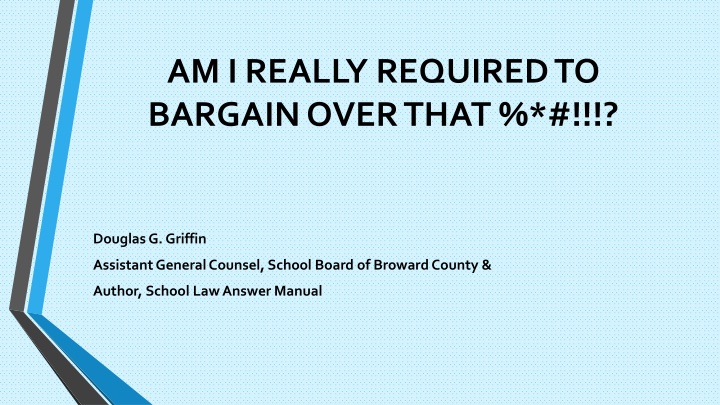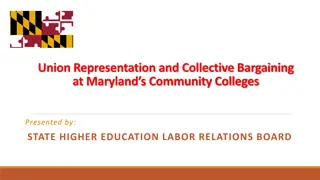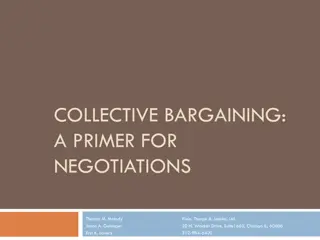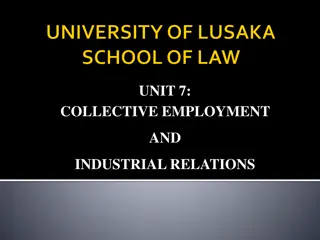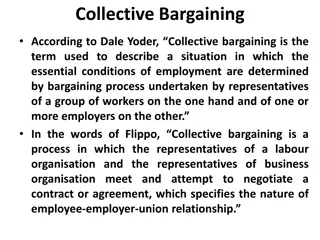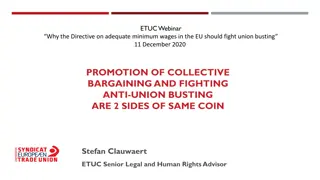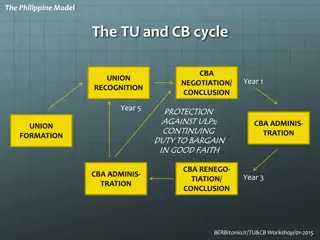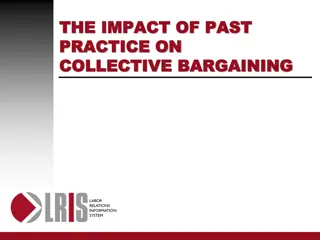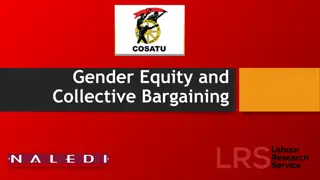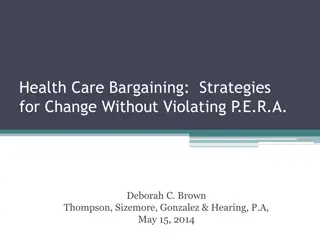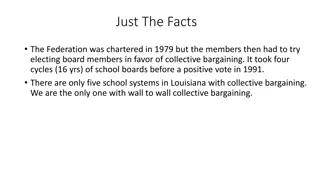Collective Bargaining in School Districts
Collective bargaining in school districts involves negotiating over mandatory and permissive subjects such as wages, hours, and conditions of employment. School districts must differentiate between mandatory and permissive subjects, and disputes over mandatory subjects must be resolved through impasse resolution procedures. Various criteria are used to determine if an issue constitutes a mandatory subject of bargaining, and the impact on terms and conditions of employment is a key factor. Districts have a duty to bargain over wages, hours, and terms of employment during negotiations, but managerial rights are excluded from bargaining obligations.
Download Presentation

Please find below an Image/Link to download the presentation.
The content on the website is provided AS IS for your information and personal use only. It may not be sold, licensed, or shared on other websites without obtaining consent from the author.If you encounter any issues during the download, it is possible that the publisher has removed the file from their server.
You are allowed to download the files provided on this website for personal or commercial use, subject to the condition that they are used lawfully. All files are the property of their respective owners.
The content on the website is provided AS IS for your information and personal use only. It may not be sold, licensed, or shared on other websites without obtaining consent from the author.
E N D
Presentation Transcript
AM I REALLY REQUIRED TO BARGAIN OVER THAT %*#!!!? Douglas G. Griffin Assistant General Counsel, School Board of Broward County & Author, School Law Answer Manual
WHAT ARE THE TYPES OF BARGAING SUBJECTS? MANDATORY SUBJECTS PERMISSIVE SUBJECTS PROHIBITED SUBJECTS
WHY DOES A DISTRICT CARE DURING BARGAININGWHETHER A SUBJECT IS MANDATORY OR PERMISSIVE? A school district must bargain over mandatory subjects; and, if the parties do not reach agreement, their dispute must be settled through the impasse resolution procedure established in Fla. Stat. 447.403. Permissive subjects may be voluntarily bargained, but they may not be bargained to impasse.
WHAT QUESTIONS MUST BE ANSWERED TO DETERMINE WHETHER AN ISSUE CONSTITUTES A MANDATORY SUBJECT OF BARGAINING? 1. Does the issue have a direct and substantial impact on wages, hours, and terms and conditions of employment? 2. Doe the issue impact an inherent managerial prerogative? 3. Does the issue involve a waiver of the union s right to bargain?
WHAT IS THE TEST FOR DETERMINING WHETHER AN ISSUE IMPACTS TERMS AND CONDITIONS OF EMPLOYMENT? Florida courts have not developed a precise test for determining whether a certain subject is important enough to be considered a term and condition of employment. Most courts therefore have determined the issues on a case-by-case basis, but, the key is how direct the impact of an issue is on the well-being of the individual teacher, as opposed to its effect on the operation of the school system as a whole.
WHAT IS A DISTRICTS DUTY TO BARGAIN OVER WAGES, HOURS, AND TERMS AND CONDITIONS OF EMPLOYMENT DURING NEGOTIATIONS? If the subject matter of a proposal is purelya wage, hour, term or condition of employment, not involving inherent managerial rights, it is a mandatory subject of bargaining and either or both parties may insist to impasse on its position. Disagreements on mandatory subject of bargaining must be resolved through the impasse resolution procedure.
WHAT MATTERS ARE CONSIDERED MANAGERIAL RIGHTS FOR PURPOSES OF DETERMINING BARGAINING OBLIGATIONS? It is the right of the school district to determine unilaterally the purpose of each of its constituent agencies, set standards of services to be offered to the public, and exercise control and discretion over its organization and operations. It is also the right of the school district to direct its employees, take disciplinary action for proper cause, and relieve its employees from duty because of lack of work or for other legitimate reasons.
When is a matter effecting both a managerial prerogative and a term or condition of employment a mandatory subject of bargaining? According to Supreme Court, the courts are to apply a balancing test to determine whether the employees right to collectively bargain, or management's right to exercise control and discretion should predominate. According to PERC, the district must negotiate such decisions unless the matter involves management prerogatives directly related to the public employer's fundamental policy prerogatives.
May a School Board impose a waiver of bargaining rights on the union? No. A waiver of the statutory bargaining rights provided by Section 447.401, Florida Statutes, is a permissive item of bargaining which may not be imposed by the legislative body.
What are the basic rules for determining whether an item is a mandatory subject of bargaining? Matters only impacting wages, hours, terms or conditions of employment are mandatory. Matters only impacting managerial prerogatives are permissive. Matters impacting both managerial prerogatives and terms and conditions of employment must be balanced to determine which predominates. Matters involving a waiver of a union s right to bargain are permissive.
Lets test our knowledge Bonuses to newly hired (e.g. STEM) teachers. MANDATORY SUBJECT Supplemental pay for extracurricular activities. MANDATORY SUBJECT Subcontracting services that will replace existing employees. PERMISSIVE SUBJECT
Lets test our knowledge (contd) Evaluation Criteria PERMISSIVE SUBJECT The number of instructional periods teachers must teach MANDATORY SUBJECT Reducing the length of the workday MANDATORY SUBJECT
Lets test our knowledge (contd) Mandatory furloughs to alleviate economic shortfalls PERMISSIVE SUBJECT Excluding discipline issues from the collective bargaining agreement MANDATORY SUBJECT Job descriptions or job classifications PERMISSIVE SUBJECT
Lets test our knowledge (contd) Duration clauses effective longer than 1 year. MANDATORY SUBJECT A salary proposal conditioned on an agreement to waive the right to bargain over changes in insurance PERMISSIVE SUBJECT Settlement of pending grievance PERMISSIVE SUBJECT
Once a permissive subject is included in the agreement, may the parties insist to impasse that it continue to be included in future years? No. Even when parties agree to include a permissive subject of bargaining in a contract, that voluntary agreement does not mean that the other party may insist to impasse that the provision be continued in future negotiations.
Does a district commit a ULP if it still has permissive subjects of bargaining in its proposals when the union declares impasse? No, so long as the district modifies its proposals to eliminate permissive subjects from its proposals before final resolution. If the Section 447.403, impasse resolution process is utilized, neither party may insist that a special magistrate consider a nonmandatorysubject of bargaining. In addition, a legislative body may not impose a nonmandatorysubject such as a waiver of a union' s right to bargain over mandatory subjects of bargaining.
WHY DOES A DISTRICT CARE DURING THE CONTRACTWHETHER A SUBJECT IS MANDATORY OR PERMISSIVE? As a general rule, a public employer may not unilaterally alter the status quo of a mandatory subject of bargaining, i.e., wages, hours, and terms and conditions of employment of its employees during the term of a collective bargaining agreement.
How is the status quo established in the event that an express term and condition in the collective bargaining agreement conflicts with past practice? When terms or conditions of employment are in a contractual provision, the status quo is determined by reference to the precise wording of the relevant contractual provision.
How is the status quo established in the event that either the agreement is either ambiguous or silent regarding a term or condition? A change to the status quo is more than that the employer changed a practice involving a mandatory subject of bargaining. It must be established that the past practice that has been altered: 1. had been unequivocal, 2. had existed substantially unvaried for a significant period of time prior to the change, and 3. could reasonably have been expected by bargaining unit employees to have continued unchanged.
When may a district unilaterally alter the status quo of a mandatory subject of bargaining during the contract? A district may only unilaterally alter the status quo of a mandatory subject of bargaining if it can establish: 1. a clear and unmistakable waiver by the union of the right to bargain over the subject, 2. legislative body action taken after impasse, or 3. extraordinary circumstances requiring immediate action.
May a district unilaterally alter the status quo of a mandatory subject of bargaining after term of a collective bargaining agreement has expired? Generally, no. Following the expiration of a collective bargaining agreement, an employer is prohibited from unilaterally altering the status quo of mandatory subjects of bargaining.
May a district unilaterally alter the status quo of a subject that is an inherent managerial right during the term of an agreement without bargaining over the decision? Yes. If the subject matter of the decision is an inherent managerial right, not involving a term or condition of employment, the school district may act unilaterally because the matter is considered a permissive subject because it falls within managerial prerogative.
Is a district obligated to bargain over any impacts on terms and conditions of employment relating to implementation of a subject that is an inherent managerial right? Yes, but only if a timely demand for impact bargaining is made by the union which identifies specific negotiable effects on wages, hours, terms and conditions of employment. An effect is negotiable if it is direct and substantial.
May a district proceed to alter the status quo of a subject that is an inherent managerial right before giving the union a reasonable opportunity to negotiate impacts? No. The district must afford the union reasonable time to impact bargain prior to implementation of a change.
Is the district required to complete the entire impasse resolution process before proceeding to alter the status quo of a subject that is an inherent managerial right? No, although the district must allow for a reasonable opportunity for the union to identify and negotiate impacts, the impasse process contained in Section 447.403, need not be completed prior to modifying the status quo. After a reasonable opportunity to negotiate the impacts, the district may declare impasse, implement its decision, and thereafter proceed to complete the impasse process.
Lets test our knowledge As has been done in the past, adjusting cafeteria workers hours up or down to meet needs (agreement is silent) Strictly enforcing language in the agreement for the first time that all mandatory extra-duty time for teachers shall be compensated at $20/hr. Adding a new extra-curricular activity that you want to pay the same as all of the comparable coaches
Lets test our knowledge (contd) Adding hour of instruction to student day because it is in the lowest 300 Changing percentage of dependent health insurance premium contribution (not stated in the agreement) Changing health insurance benefits (e.g. deductibles, co-pays, etc.) where plan is mentioned by reference (e.g. the health insurance plan provided by the Board. ) Changing health insurance benefits (e.g. deductibles, co-pays, etc.) per recommendation of the long-established district insurance committee.
What are prohibited subjects of bargaining? Provisions of an agreement are null and void from the outset only when they: 1. Involve unlawful subjects of bargaining, 2. Are contrary to a statute or constitutional provision, or 3. Seek to achieve a purpose contrary to public policy.
What are examples of prohibited subjects of bargaining? Smoking on Campus. Binding interest arbitration. Just cause for non-renewal of probationary teachers.
